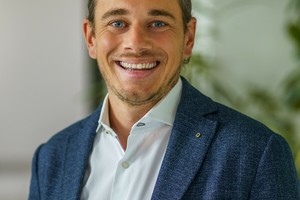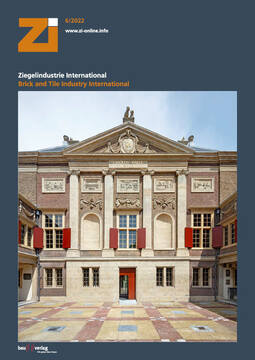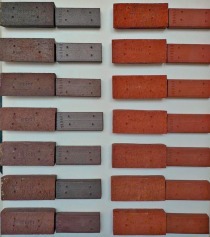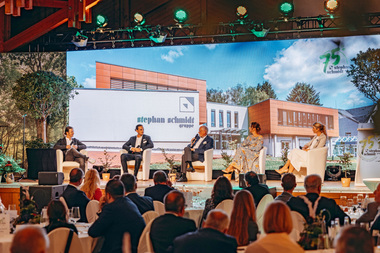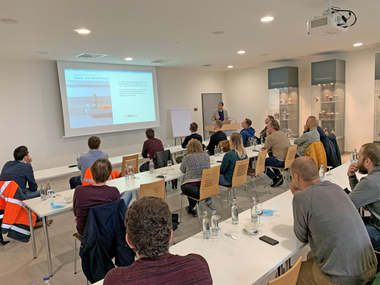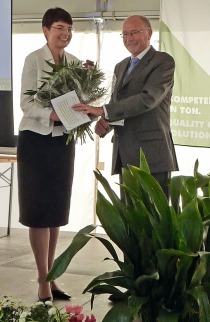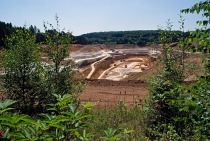„Delivery reliability and quality is our most important claim“
Stephan Schmidt KG is celebrating the 75th anniversary of its founding this year. Shortly after the official celebrations in Dornburg in Hesse, we spoke with the managing partner of the family-owned company, Stephan Schmidt, about the past, present and future of the clay specialist. How it came about that the eponymous grandfather went into clay, why the loss of Ukrainian clay exports is less a blessing than a curse for the German clay manufacturer and what contribution the company can make to accompany and support the brick industry on its way to climate neutrality, you can read in this interview.
That has to do with the place, the time and the family. The family comes from the Westerwald, where basalt and clay are widespread. My great-grandfather was already active in basalt mining as a plant manager. My grandfather therefore also started working in basalt in 1946, when he was looking for work after returning from being a Russian prisoner of war. After a year, he was offered the opportunity to mine clay in underground mining as a contractor for another company. A few years later, he took over the mining concession and started his own business.
Among the first customers were refractory companies for whom my grandfather still fired fireclay. An important milestone for the development of the company was when the largest manufacturer of tiles in Central Hesse at the time, the Gail company from Gießen, became a customer. Not only as a customer, but above all because of the high demands on quality and stability of our raw material mixtures. We have learned a lot for our technical development through this.
This kind of symbiotic relationship with a customer was normal for us in the early years. After all, we were the youngest clay company on the market. It was difficult to establish direct market access. That‘s why we sold our raw materials to other clay and mining companies, as was customary at the time, who then took care of the final distribution themselves. It was my father Günther Schmidt who first established his own market access with a network and customer base. He also established connections in France and Italy. Distribution was a one-man show.
We only really started supplying bricks at the beginning of the 1990s after we took over the TGA (Anton clay pit). At that time, the independent clay quarry actually only supplied white clays for sanitary ware and tile production. Brick manufacturers mostly used the clay behind their own factory. This began to change due to increasing demands on building ceramic products, for example on the shape retention and the heat transfer coefficient of backing bricks. For corresponding material adaptations, brick manufacturers began to integrate foreign raw materials into the clay mixtures. This is how the market for Westerwald special clays emerged as a standard component for brick production. Thanks to the 200,000 tonnes of red-firing clays that were in stock at TGA, we were able to deliver at the right time. The technical development in this area continues to this day. Modern large-format roof tiles, for example, require a mixture of different clays and aggregates. Standardised clay from the Westerwald is always part of this.
I would first like to attribute this achievement to my father‘s entrepreneurial foresight and courage. He always said: Whoever has the raw materials also has the market. So success in our industry depends on securing raw material deposits, mining rights and land for the future. Deposit security was a priority for my father, which is why he always invested profits in new raw material deposits and processing plants. This also enabled him to open up new markets for the company. He also did not shy away from making large long-term upfront investments. For example, he saw at that time that there was great market potential in grinding clays. The big entrepreneurial risk he took by building two large grinding plants within a few years has paid off. Today we produce between 120,000 and 150,000 tonnes of grinding clays, granulates and pellets annually.
However, family cohesion in combination with clear structures is also decisive for the company‘s development. Many former market participants have unfortunately left the company because intra-family disputes affected the course of business to the point of market closure. That is why the understanding and good cooperation between my two older sisters and me is a real model for the future. The three of us tick similarly to our father and think in the long term. What we do today must always be the foundation stone for the next generation.
Our commitment to research and development is also due to this long-term perspective. Our goal is to conserve resources and stretch them as far as possible. That is why we also look beyond the end of our nose. Although we are traditionally closely linked to ceramics production, we are primarily a raw materials company. We already generate about one third of our current turnover outside the ceramics sector with advanced clay minerals, such as special clays, pellets and granulates for various applications in the construction sector. Our goal is a 50:50 sales ratio for both business units, without neglecting our main market of ceramics.
We feel the war most directly in energy costs. These are clearly noticeable in very energy-intensive processes, in the production of ground products and coloured engobes. The same applies to processes with a high heat demand, such as the removal of pit moisture from the clays and the drying of pellets, granulates and powders. We have a relatively high gas consumption. Increased energy and especially diesel prices are also noticeable in the extraction costs for operating our own or rented construction machinery for overburden removal and intermediate transport. An indirect effect is that international transports to the customer in particular have become insanely expensive. Another indirect effect is that when our customers have to stop production because of the cost of gas, they no longer need clay. Fortunately, this is still within limits.
For the most part, we still manage to pass on the cost increases to the product prices. Against the background of international competition, however, this is not a solution for all cases. For example, the gas levy, which was still being discussed in early autumn, would have been unsustainable for us with additional costs in the six-digit range. But even so, the situation is tense. Some ceramics manufacturers, also customers of ours, have already had to temporarily shut down their operations. Even if many of them will get back on their feet, I am firmly convinced that we are only at the beginning. Winter is yet to come, energy prices will remain high. The slowdown in construction is also affecting the demand for clay. In any case, there will be a slowdown in the market. While business activity has been largely stable this year, we expect relative declines next year. However, we do not see a dramatic slump because the large part of our business is in exports. I have some hope that we will come through the crisis in a stable way, but it will be a challenge for us as well as for the whole economy.
The Ukraine was a tough competitor in Italy, our most important sales market. We export around a third of our annual production, 500,000 tons, there. The entire German clay industry supplies one million tons. Two million tons of clay came from the Ukraine every year. Their abolition has left a huge gap that we cannot close, despite a joint German-Italian declaration of intent. There simply isn‘t the capacity for it.
I would be happy if Ukrainian
clay pits would return to the market. That would mean no risk, but a return to normality, which would do us all good. Despite competition, there used to be a stable market equilibrium. Without Ukrainian clay, the tile market in Italy will shrink. Conversely, more tiles will come from China and India. In this country and in Italy, nobody can like that.
We have to differentiate between skilled workers and workers. The Stephan Schmidt Group has so far been successful in filling highly qualified positions with ceramic engineers, mineralogists, geologists and mining engineers. We traditionally maintain good contacts with the universities. In these circles we also have a good image as an innovative family company. It is becoming more difficult to meet the need for workers. We are noticing the demographic change. The competition for the available staff is becoming increasingly fierce. In addition, the work in the clay pit is not particularly attractive at first glance: shift work and working outdoors, whether in winter or summer. The funding is already largely automated. In the foreseeable future, however, it will not be possible without people. Fully automated opencast mining is still decades away from us.
Young people are therefore an issue for us. We try to inspire new staff for our company through various incentives and good working conditions. I see our location in rural areas as an advantage. People with an agricultural background usually have experience with tractors and an affinity for large machines. You are tough and familiar with physical work outdoors. There is a certain amount of young talent there for us, but you never know how big that will be in the future.
Among other things, we will concentrate on a worldwide unique selling proposition of the Westerwald clays. In our 20 opencast mines we distinguish between 400 individual clays. Based on our 75 years of know-how, we can mine the clays individually in a highly selective manner and process them into mixtures according to their properties. Think of it like baking a cake. This puts us in the unique position of being able to put together an individual mixture tailored to our customers‘ production needs and parameters. Especially in the last few years, with the collaboration of Prof. Ralf Diedel, we have been able to make significant progress. Today we examine between 70 and 80 characteristics per type of clay. However, there is still a great need for research in the ceramics sector, for example with regard to the liquefaction properties, which are relevant for sanitaryware production and other liquid processes. The same applies to large areas outside of the ceramic.
The future of sound production is twofold for us. As mentioned, we want to expand the Advanced Clay Minerals division significantly. In contrast, our focus in the area of classic ceramics is more on product optimization in cooperation with our customers. In the case of the brick industry, we see our role in supporting the industry in implementing the roadmap to climate neutrality. For example, with our high-quality raw materials, we supply functional components that allow raw material mixtures with a higher proportion of recycled material. So we see ourselves as part of the solution towards climate neutrality. Various forms of processing, such as ground clay, will also be among our future topics. We benefit greatly from the fact that, in contrast to many other brick clays, our clays are almost free of organic matter and lime. No CO2 escapes from the clay during kiln firing. That‘s a huge advantage.
In addition, we are working intensively on the use of renewable energies. This initially applies to the installation of systems for the use of solar power. For example, we are currently installing a larger photovoltaic system in our largest mine in Meudt to operate a conveyor belt 850 meters long. Where it makes sense, we will also implement this at other locations. To mark the anniversary, this year we also published our first sustainability report by disclosing our efforts in the various areas.
Another project involves the in-house production of green hydrogen using green electricity. As a first step, we want to substitute 20 percent of natural gas with hydrogen in one of our processing plants. If the process proves its worth, thanks to the modular design, we can expand hydrogen production very quickly and thus save a large amount of fossil fuels. The long-term goal is to be able to offer our customers climate-neutral raw materials. This can still be seen on the balance sheet for the time being. There is still a long way to go before we can completely dispense with the use of natural gas.

